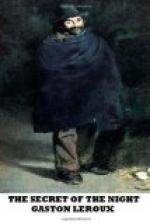A war whose powder fumes reeked still, a revolution whose last defeated growls had not died away at the period of these events, had not at all diminished the nightly gayeties of Kretowsky. Many of the young men who displayed their uniforms that evening and called their “Nichevo” along the brilliantly lighted paths of the public gardens, or filled the open-air tables, or drank vodka at the buffets, or admired the figures of the wandering soubrettes, had come here on the eve of their departure for the war and had returned with the same child-like, enchanted smile, the same ideal of futile joy, and kissed their passing comrades as gayly as ever. Some of them had a sleeve lying limp now, or walked with a crutch, or even on a wooden leg, but it was, all the same, “Nichevo!”
The crowd this evening was denser than ordinarily, because there was the chance to hear Annouchka again for the first time since the somber days of Moscow. The students were ready to give her an ovation, and no one opposed it, because, after all, if she sang now it was because the police were willing at last. If the Tsar’s government had granted her her life, it was not in order to compel her to die of hunger. Each earned a livelihood as was possible. Annouchka only knew how to sing and dance, and so she must sing and dance!
When Rouletabille entered the Krestowsky Gardens, Annouchka had commenced her number, which ended with a tremendous “Roussalka.” Surrounded by a chorus of male and female dancers in the national dress and with red boots, striking tambourines with their fingers, then suddenly taking a rigid pose to let the young woman’s voice, which was of rather ordinary register, come out, Annouchka had centered the attention of the immense audience upon herself. All the other parts of the establishment were deserted, the tables had been removed, and a panting crowd pressed about the open-air theater. Rouletabille stood up on his chair at the moment tumultuous “Bravos” sounded from a group of students. Annouchka bowed toward them, seeming to ignore the rest of the audience, which had not dared declare itself yet. She sang the old peasant songs arranged to present-day taste, and interspersed them with dances. They had an enormous success, because she gave her whole soul to them and sang with her voice sometimes caressing, sometimes menacing, and sometimes magnificently desperate, giving much significance to words which on paper had not aroused the suspicions of the censor. The taste of the day was obviously still a taste for the revolution, which retained its influence on the banks of the Neva. What she was doing was certainly very bold, and apparently she realized how audacious she was, because, with great adroitness, she would bring out immediately after some dangerous phrase a patriotic couplet which everybody was anxious to applaud. She succeeded by such means in appealing to all the divergent groups of her audience and secured




